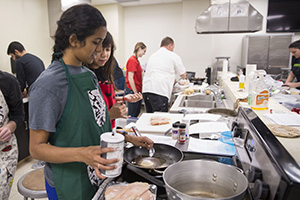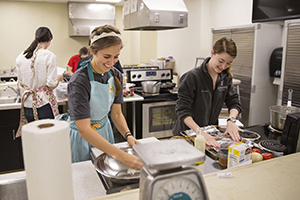Culinary Medicine Elective Teaches Medical Students About Nutrition
 Studying in a clinical or classroom setting is normal for medical students. For this
class however, instead of stethoscopes and classrooms, students trade in their white
coat for an apron, the medical equipment for stoves and cooking utensils and a chef
becomes the professor. This is Culinary Medicine, a new fall elective established
by Sarah Jaroudi and Bill Sessions, both second-year medical students.
Studying in a clinical or classroom setting is normal for medical students. For this
class however, instead of stethoscopes and classrooms, students trade in their white
coat for an apron, the medical equipment for stoves and cooking utensils and a chef
becomes the professor. This is Culinary Medicine, a new fall elective established
by Sarah Jaroudi and Bill Sessions, both second-year medical students.
“We saw a need for education about nutrition that was not in the curriculum,” Sessions said. “The lectures explored various nutritional concepts and the labs were taught by chefs where medical students applied their knowledge and learned how to prepare healthy meals.”
Each Tuesday night, twenty medical students in groups of two at each station were given a case study, which was built upon with each lab. Every group was given a recipe for a total of five recipes.
“The idea was to create different interpretations of recipes surrounding a central idea so that students can compare and contrast the techniques and nutritional content,” Jaroudi said. “The mission of the elective is to educate and train medical students to develop and maintain healthy habits and perspectives that will benefit themselves, their communities and most importantly their patients.”
The School of Medicine students studied culinary medicine at the HEB Culinary Laboratories at the Texas Tech University (TTU) College of Human Sciences. Chef Dewey McMurray, CEC, executive chef of operations at TTU, taught the students cooking techniques, answered questions and wrote the recipes for the program.
 “When the medical students contacted me, I was surprised and excited to hear about
the program,” McMurray said. “Culinary Medicine is a pretty interesting initiative
to learn in this manner. The students always had great questions and enthusiasm to
learn more.”
“When the medical students contacted me, I was surprised and excited to hear about
the program,” McMurray said. “Culinary Medicine is a pretty interesting initiative
to learn in this manner. The students always had great questions and enthusiasm to
learn more.”
Katherine Chauncey, Ph.D., RDN, course director and a nutritionist in the Department of Family and Community Medicine, said this course was organized and driven by medical students.
“With the first class, the students were given a recipe and made it in a normal fashion with any ingredients necessary. As the classes progressed, the students took the same recipe and began to incorporate healthier options for foods such as brown rice for white rice, healthier lower carbs or enhance nutrients by adding other items. Each student also was given a scenario with a patient who has been diagnosed with an illness such as diabetes, renal disease, etc. The students not only began to think about how to make the meal healthier, but also think of how to cook the meal for the prognosis each patient has.”
Taylor Lindgren, a second-year medical student, was assigned a recipe that included garlic chicken parmesan and sweet potato wedges and carrots. Lindgren was surprised by how many different options patients with certain dietary needs have through simple changes in their meal choices.
“One group cooked a delicious, Caribbean-inspired meal catered to renal patients who have dietary restrictions on protein, phosphorus and other nutrients,” Lindgren said. “Without being told about these restrictions, I wouldn’t have been able to tell. I loved learning about how to apply concepts from the Culinary Medicine elective not only to my own life, but also to the lives of my future patients. Learning to make simple, healthy changes in a variety of cuisines can help me and my classmates provide effective and realistic patient education to people who many not initially know how to incorporate their diagnoses into their lives.”
Related Stories
Celebrating Veterans: TTUHSC’s General Martin Clay’s Legacy of Service and Leadership
From his initial enlistment in the Army National Guard 36 years ago to his leadership in military and civilian health care management roles, Major General Martin Clay’s career has been shaped by adaptability, mission focus and service to others.
Texas Tech University Health Sciences Center School of Nursing Named Best Accelerated Bachelor of Science in Nursing Program in Texas
The TTUHSC School of Nursing Accelerated Bachelor of Science in Nursing (BSN) program has been ranked the No. 1 accelerated nursing program in Texas by RegisteredNursing.org.
TTUHSC Names New Regional Dean for the School of Nursing
Louise Rice, DNP, RN, has been named regional dean of the TTUHSC School of Nursing on the Amarillo campus.
Recent Stories
The John Wayne Cancer Foundation Surgical Oncology Fellowship Program at Texas Tech University Health Sciences Center Announced
TTUHSC is collaborating with the John Wayne Cancer Foundation and has established the Big Cure Endowment, which supports the university’s efforts to reduce cancer incidence and increase survivability of people in rural and underserved areas.
TTUHSC Receives $1 Million Gift from Amarillo National Bank to Expand and Enhance Pediatric Care in the Panhandle
TTUHSC School of Medicine leaders accepted a $1 million philanthropic gift from Amarillo National Bank on Tuesday (Feb. 10), marking a transformational investment in pediatric care for the Texas Panhandle.
Texas Tech University Health Sciences Center Permian Basin Announces Pediatric Residency Program Gift
TTUHSC Permian Basin, along with the Permian Strategic Partnership and the Scharbauer Foundation, Feb. 5 announced a gift that will fund a new pediatric residency.
